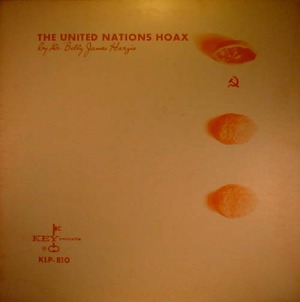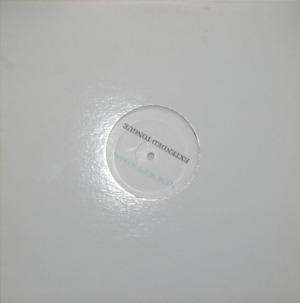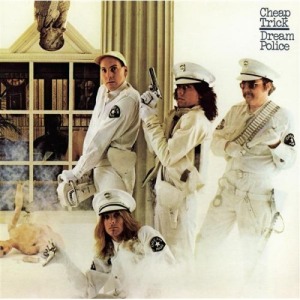56. Dr. Billy James Hargis - The United Nations Hoax - Key Records, 1962

Why I Bought It: There’s really no doubt as to what will be on this LP—anti-communist rhetoric, check—and the cover is vague enough to be foreboding, so there goes a dollar. I didn’t know who Dr. Billy James Hargis was when I bought it, but it’s hardly a surprise that “the world’s leading anti-communist evangelist” was also one of the founders of the Religious Right. If nothing else, this record could be filed away with a number of other “Party’s over, folks, let’s get out of here” curiosities.
Verdict: This “fact-packed album” (thanks, Matt Cvetic, former FBI counterspy and liner-note scribe) is just as infuriating as I expected. Hargis, as paraphrased so effectively by Cvetic, argues that the United Nations is a “Soviet-controlled predatory monster—housed, clothed, and fed by those it plans to consume... the American people!” This alarmism isn’t backed up by anything other than basic facts about the constituency of the United Nations at the time, so he’s not rolling out evidence of damning policy change. I’m tempted to type out the liner notes, since they’re loaded with overblown rhetoric, but I’m sure you get the drift. I admittedly only listened to one side of this LP, which is against my usual “suffer through all of it” policy, but it’s not like Hargis is likely to save his hottest tracks for the flip.
I’m sure this issue will come up again with a few more novelty LPs, but political rantings like The United Nations Hoax no longer garner vinyl pressings thanks to the rise of television (FoxNews), the internet, and specifically podcasts. It would be rather amusing if Keith Olbermann took advantage of the recent resurgence in vinyl (and the liberal leaning I presume accompanies it) by releasing a gatefold pressing of his special comments. Maybe Ben Affleck could write the liner notes.
57. New Wet Kojak - Extended Tongue and Miramax - Akashic, 1997

Why I Bought It: My rabid Girls Against Boys fandom was coming to a fever pitch around the time of New Wet Kojak’s second LP, 1997’s Nasty International. The Touch and Go catalog called it “4:00 am basement lounge,” which is an astonishingly accurate assessment of the music’s creation and its designated listening environment. Subtract GVSB’s rhythmic drive, add some skronking horns, turn Scott McCloud’s vocals down to backroom whispers, and you have a New Wet Kojak song. It’s a self-indulgent mess, but hey, it’s a side project.
Their self-titled debut was decidedly half-baked, but Nasty International felt almost like a real album, if not a particularly memorable one. Switching between leering, mid-tempo rock songs and slow-grind ballads, Scott McCloud and Johnny Temple found a new formula to exploit. Following GVSB’s disappointing major label debut, the grossly over-produced Freak*on*ica, New Wet Kojak’s next album, 2000’s Do Things, perfected McCloud’s late-night come-ons and sloganeering. Sometimes it sounded great (4:00 am), sometimes I was embarrassed to listen to it (daytime), sometimes lines like “Don’t miss sexy fun! Do things!” became ironic catch phrases during road trips, but it felt like a real band. Too much like a real band, in fact.
By this point, Girls Against Boys was frustrated by the aftermath of their Geffen deal and slowing down their pace. They did a few soundtracks (the New Order-esque “One Dose of Truth” from the Series 7 OST being the overwhelming highlight) and came back to the independent life with 2002’s Jade Tree outing You Can’t Fight What You Can’t See, a nice return to formula, but the writing was on the wall. Underlining that writing was how professional New Wet Kojak’s next two releases sounded, the 2001 No. 4 EP and the 2003 This Is the Glamorous LP. No longer did the group evoke “4:00 am basement lounge.” It was a strange, unbecoming evolution, since the more New Wet Kojak tried to rock, the more I longed for GVSB.
GVSB’s been on permanent hiatus since 2003, coming out of hiding only to perform a few key gigs. New Wet Kojak must’ve suffered the same fate shortly thereafter, but I simply never cared enough to note their demise.
This particular LP is a fine document of that malaise. A limited edition 12” with extended cuts of two New Wet Kojak songs should be marked directly to a GVSB fanboy like myself, but I waited until Reckless marked it down to a few bucks before grabbing it. By that point, New Wet Kojak had gone professional and I’d stopped listening to their earlier records, so this LP was filed away with my other completionist urges.
Verdict: I should have been wary of the word “extended” in the loose world of New Wet Kojak. “Stick Out Your Tongue” already earned an aimless, unnecessary remix on New Wet Kojak, but the group found it prudent to release an interminable cut of this remix on this EP. I don’t view this song as a remix, however, since it’s too organic to sound like anything other than “Tape’s rolling, let’s fuck around before we leave for breakfast.” Nasty International’s uninteresting minute-long snippet “Miramax #1” is dragged out over the entire flipside at 33 rpm. There’s a brief moment when a sampled female vocal fits with the ramshackle groove in a compelling way, but they ruin it within seconds. Any critic citing New Wet Kojak as one of the most embarrassing side projects in recent memory has ample evidence here. These extended cuts make their first few records seem enticingly focused in comparison, but also gave me enough New Wet Kojak to last for a few years. I’ll stick with Girls Against Boys, thanks.
58. Cheap Trick - Dream Police - Epic, 1979

Why I Bought It: The first ten seconds of “Dream Police.” I must’ve seen this LP fifty times before “The dream police they live inside of my head” finally convinced me to drop a dollar on this Cheap Trick LP. Too bad “Surrender” and “I Want You to Want Me” aren’t on this record.
Verdict: I honestly can’t recall if I’d ever heard the entirety of “Dream Police” the song, but Dream Police the album is overblown in the biggest, most ’70s ways possible, whether it’s in synthesizer/string flourishes or epic track lengths. “Gonna Raise Hell” drags on for a seemingly interminable 9:20! The otherwise solid “Need Your Love” carries on for 7:20! I expected more of a power-pop feel to the record, but only “Dream Police,” “Voices,” and “Need Your Love” deliver. The other songs suffer from forced aggression (“This House Is Rockin’ [With Domestic Problems]”), too much soloing, and/or a lack of humor, which surprised me given “Surrender.” Hardly a surprise, then, that Dream Police is usually regarded as a drop-off in quality after their first three releases.
59. Terje Rypdal - Waves - ECM, 1978

Why I Bought It: I decided to take a chance on a completely unfamiliar ECM title and artist because it was a dollar and I’d been listening to a lot of Steve Reich’s ECM recordings at the time. I never thought, “This album is going to be just like Music for 18 Musicians,” nor did I have a strong sense of what it would sound like. Understandably, it took me a while to muster up the gumption to give this album a listen, but this excellent article from Perfect Sound Forever gave me a much better sense of what to expect from Waves and how it fit into Rypdal’s catalog.
Verdict: Trying to get a handle on Rypdal’s style, even with that article in mind, is a difficult process. Opener “Per Ulv” combines bop jazz and prog-rock guitar, sounding a bit like Santana joining a jazz trio onstage. Closer “Charisma” drops most of the jazz overtones, merging prog explorations and the atmospheric spaces of Tangerine Dream for the first song that sounds stereotypically Nordic. Most songs are dominated by trumpeter Palle Mikkelborg rather than guitarist/keyboardist Rypdal, which keeps things on the jazz side of the equation more often than not, but the compositions splay out like 1970s prog. The key word for Waves is “intriguing,” since I even as the record progressed I never got a handle on what to expect next.
60. Nitzer Ebb - That Total Age - Mute, 1987

Why I Bought It: I knew that Nitzer Ebb fit into the late 1980s and early 1990s industrial scene, presumably from my bathroom reading sessions of The Trouser Press Guide to 1990s Rock. I’d gone through a brief and by no means comprehensive industrial phase my freshman year of high school prompted by Killing Joke’s Pandemonium and Nine Inch Nails’ Nothing Records, but my fondness for the genre expired before I did any major backwards exploration. When I stumbled across a number of 1980s industrial LPs in the dollar bin, including Nitzer Ebb, Skinny Puppy, and Einstürzende Neubauten, I snapped them all up, intending to fill the gaps in my 1994-1995 listening pile. I even had a decent idea of what to expect from each artist—electronic-heavy, somewhat pop industrial from Nitzer Ebb; abrasive and aggressive industrial from Skinny Puppy, and actual industrial sounds from Neubauten. I say actual since so much industrial ends up sounding like mean, heavy synth-rock. Nine Inch Nails’ Pretty Hate Machine broke in the mainstream because it was ostensibly mean, heavy synth-pop. It makes sense to start with Nitzer Ebb, since they’re closest to my industrial experience, but those Skinny Puppy and Einstürzende Neubauten LPs will come up later in RCR.
Verdict: That Total Age punishes the listener with a minimal combination of electronic beats, repeated phrases, and up-front bass for maximum damage. Wikipedia informs me of an industrial sub-genre called electronic body music, which isn’t far off from my initial take on songs like “Fitness to Purpose” and “Let Your Body Learn”: an S&M fetishist drill sergeant remaking Olivia Newton John’s “Physical.” A few of the songs diverge from the murderous repetition, paying off my pop expectations, but most chug along with endlessly repeated shouted slogans. At one point I thought “It’s like an entire record of extended 12” takes!” but only the aptly titled “Join the Chant” goes past six minutes. By the end of That Total Age I was exhausted from Douglas McCarthy’s barked vocals, so a single 12” EP might’ve been a better pick-up. Nitzer Ebb confirmed by expectations, sure, but they also underscored why Nine Inch Nails needed to incorporate more traditional synth-pop hooks and structures to cross over.
|

